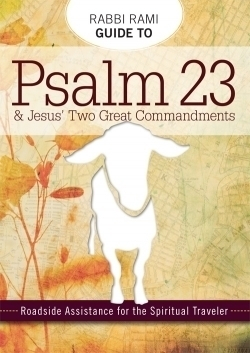Rabbi Rami Guide to Psalm 23 & Jesus' Two Great Commandments
Roadside Assistance for the Spiritual Traveler
Psalm 23 is undoubtedly one of the most beloved chapters in the Bible. Trying to find fresh insights into these six verses presents a challenging task for any author. But when the writer also attempts to cover Jesus’ two great commandments to love God and love your neighbor, it truly is a lofty goal. Rabbi Rami Shapiro, however, boldly accepts the challenge and masterfully unfolds some hidden treasures in these iconic passages.
Rabbi Shapiro, a congregational rabbi for twenty years and the author of over two dozen books, skillfully dissects each phrase of Psalm 23. His Jewish perspective and vast knowledge of culture and the Hebrew language allows him to open up explanations and background that readers with other religious viewpoints most likely have not been previously aware of or did not fully understand in light of the Jewish context. Some of his thoughts may even seem radically different than what has traditionally been taught, especially in Christianity.
For example, Rabbi Rami explains that the story of Barabbas being released from prison instead of Jesus, due to a Roman custom, is essentially unfounded, since there are only two known sources recording such a custom. “Think of it as a literary device to setup the Barabbas story. If they are going to blame the crucifixion of Jesus on the Jews, the Gospel writers need the throngs of Jews to call for the release of someone other than Jesus, and they solve the problem with the invention of Barabbas.” While fully explaining the reasoning behind his claims, the rabbi never attempts to sway anyone to a particular religious viewpoint.
The author does not merely look at the various phrases of Psalm 23 and rehash the serene, comforting analogy of Jesus shepherding His sheep. He instead reveals the deeper meanings of words in their original languages and context to illustrate unfamiliar concepts, such as the Valley of the Shadow of Death (verse 4) referring to life itself, not just a person’s moments before entering eternity. This springboards him into some interesting comments on death and the meaning of the psalmist’s assurance that “I will fear no evil for Thou art with me.”
Rabbi Rami excels at relating fresh insights into Biblical passages that many people may have overlooked despite reading them many times. A new angle, a different perspective, or an alternate approach is his ample gift to readers who want to deepen their love and understanding of the Bible.
Reviewed by
Jeff Friend
Disclosure: This article is not an endorsement, but a review. The publisher of this book provided free copies of the book and paid a small fee to have their book reviewed by a professional reviewer. Foreword Reviews and Clarion Reviews make no guarantee that the publisher will receive a positive review. Foreword Magazine, Inc. is disclosing this in accordance with the Federal Trade Commission’s 16 CFR, Part 255.

